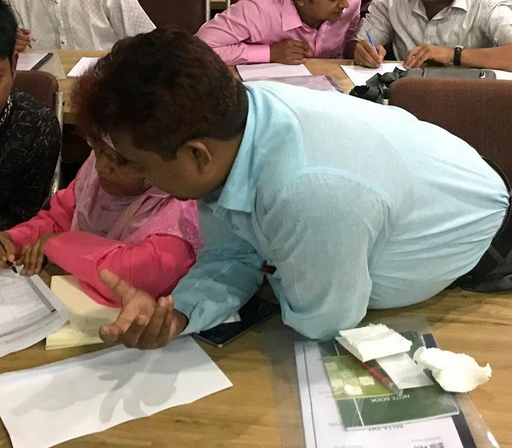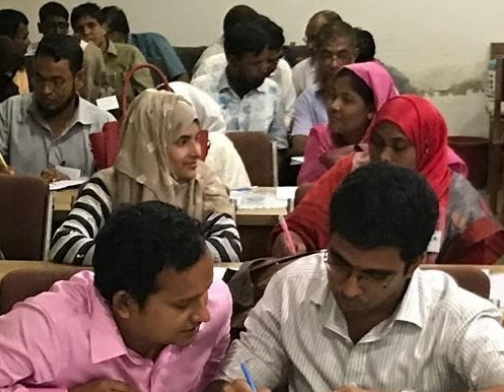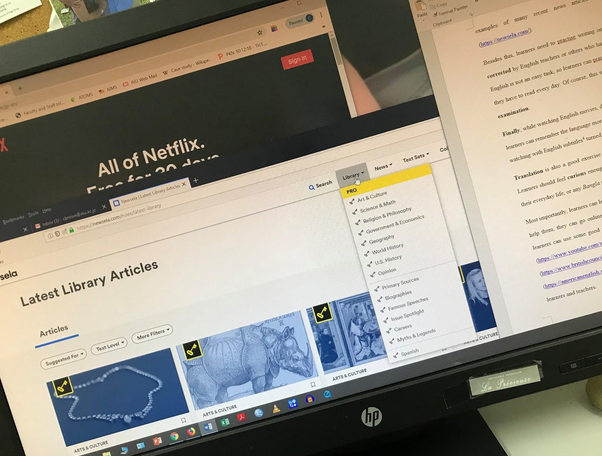Learning English Efficiently
The one question that I am often asked as an English teacher is how someone can learn English so as to become an efficient user of the language. People also ask which books they can study for this purpose. Sadly, there isn’t any one guide book that meets all their needs. Nor is learning a matter of one week or a month. Rather, learning a foreign language is a life-long process.

Learning becomes easier and faster when learners get exposure to the language. Apart from university classes, it is difficult for students in Bangladesh to experience an environment in which English is used all the time to communicate, so how can they get the exposure to English that they need, in a country in which English is a foreign language?
Clearly, this exposure has to be made artificially, often by students themselves. Of course, students can make an effort to speak with their peers in English. They can also go to the library and read English newspapers in their class breaks, listen to English news, and watch English documentaries and movies in their free time. But surely there is much more that they can do.
The first and most important task of a foreign language learner is to practise the target language. I have often observed my students making grammatical mistakes. I think all of these mistakes happen, not because they do not know the grammatical rules, but because they do not have enough practice speaking the language. Often they make very small mistakes in their speech due to a ‘slip of the tongue’1, simply because they forget to use something that they already know.

To fix these kinds of mistakes, they need to communicate more often in English, and for that they need a good speaking partner. Both partners should listen to each other carefully and tell each other when they notice such mistakes. It is also a good idea, when you are corrected, to repeat the correct form a few times. By practicing in this way, the right forms will come more naturally the next time.

The second important need is to develop strong listening skills. My students often say that they can understand the class lectures in English, but face difficulties when they listen to native speakers. This happens, in part, because many of us are not familiar with the International Phonetic Alphabet (IPA)2. It is true that English language has 26 letters in its alphabet but learning to say each sound in the right way is easier if one also learns and masters the 44 IPA symbols English uses. However, an online speaking dictionary can be used in place of learning IPA. When using this, learners just need to click on the words to hear how to say each word.
Again, getting exposure to native speakers is very easy. You just need your mobile phone and perhaps some headphones, and then turn on your FM radio to 100 hertz to listen to English on the BBC. At first, learners may have to listen to the speeches patiently, as it may be difficult to catch everything, but over time, understanding should become easier.
Along with the BBC, students can also listen to English songs. For that, FM radio ‘Edge 95.6’ is a good resource, as this station mostly runs English songs. In these ways, the day will come when the learners can understand 100% of what is being spoken, in news or on the radio or in a native speaker’s speech. The more they listen, the more learners can build their listening skills.
Thirdly, learning new words every day is good for developing your knowledge of English vocabulary, and for creating original sentences when speaking. Keeping a diary3, and using new words in your daily writing, works well for this purpose. Sometimes hanging a board in your room and writing up new words with their meanings works well, because when you look at the board, even if you do not think about it deeply, you may notice the words there and your learning goes on without you even thinking about it, even when you are just taking a rest.
Fourthly, reading and writing skills have to be practiced equally, along with the other skills. To be a fast reader, students should read English daily newspapers, e.g. ‘The Daily Star’, or ‘New Age’, for example. Although it is difficult to read the whole English newspaper, serious students should at least read one news article a day. Lower level learners can read easier examples of many recent news articles on websites such as Newsela.com.
Besides this, learners need to practise writing on different topics and get their sentences corrected by English teachers or others who have strong English skills. Writing a page in English is not an easy task, so learners can practise by summarising the textbook chapters they have to read every day. Of course, this will also help them to prepare before taking an examination.

Finally, while watching English movies, documentaries and videos is also very helpful, and learners can remember the language more easily when they see the situations on the screen, watching with English subtitles4 turned on is even more helpful.
Translation is also a good exercise for becoming a strong user of the English language. Learners should feel curious enough to translate Bangla sentences that they come upon in their everyday life, or any Bangla sentence that comes to their mind.
Most importantly, learners can learn English online. For those times when there is no one to help them, they can go online and learn the target language on their own. For example, learners can use some good resources in the lessons provided by Oxford Online English (https://www.youtube.com/user/oxfordonlineenglish). The British Council website (https://www.britishcouncil.org/english/learn-online) and American English website (https://americanenglish.state.gov/) also contain a large number of useful materials both for learners and teachers. You can even find an online teacher or a speaking partner.
Of course, if a learner ever needs help, English teachers are usually available during their open office hours to meet with students, or again, direct contact can be made online.
Learning the English language does not mean studying a course for only one term and passing an exam at the end of it. It means becoming life-long learner. When there is no English course, students can learn on their own by studying English newspapers, listening to English news, songs, practicing speaking with their friends, watching videos, visiting some educational websites and using the Internet and online methods.
However, learners should remember that the main purpose of learning another language is to communicate effectively with others who also speak that language. These ideas will help anyone who really wants to build their skills. Such learners will find it is very cheap and easy if they have a clear plan, and if they make an ongoing effort to try hard.
_________________________________________________________________________
Learning Activities
Vocabulary Lists: learn all of the words from the following two lists…
-
High Frequency Words from the 2nd 1000 General Service Word List
| Apart | Curious | Guide | Patiently | Practice (American English spelling - noun and verb) | Sentence |
| Artificially | Dictionary | International | Phone | Radio | Skills |
| Cheap | Educational | Mistakes |
Practise (British English spelling – verb) |
Sadly |
Tongue |
| Corrected | Examination (or Exam) | Original | Practice (British English spelling – noun) | Screen | Translation |
-
High Frequency Words from the Academic Word List
| Available | Creating | Finally | Partner | Summarising (British English spelling) | Target |
| Chapters | Environment | Lectures | Process | Summarizing (US English spelling) | Task |
| Communicate | Exposure | Ongoing | Resource | Symbols | Topic |
Glossary
-
Idiom “A slip of the tongue” = to make a careless mistake when speaking
-
International Phonetic Alphabet = A set of symbols used to show the specific sounds of a language. You can find more information about this at the URL below.
http://www.internationalphoneticalphabet.org/ipa-sounds/ipa-chart-with-sounds/
-
Diary = a book in which people write down their daily activities and thoughts about each day
-
Subtitles = the writing you can see at the bottom of the screen when you watch a movie or TV programme. The writing closely matches what the speakers are saying.
Creative Speaking and Listening Activity
Fill in the timetable below with your normal activities for one week. Add some times for practicing English more. What kind of English language practice will you do, and when will you do it?
When you have finished, explain your timetable to another person in English. Give reasons for your choices of English language practice activities and the times at which you plan to do them. Can you find a time that suits you both to meet up and practice speaking in English?
| Time | Mon | Tue | Wed | Thu | Fri | Sat | Sun |
| 8.00 | |||||||
| 10.00 | |||||||
| 12.00 | |||||||
| 2.00 | |||||||
| 4.00 | |||||||
| 6.00 | |||||||
| 8.00 | |||||||
| 10.00 |